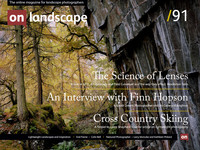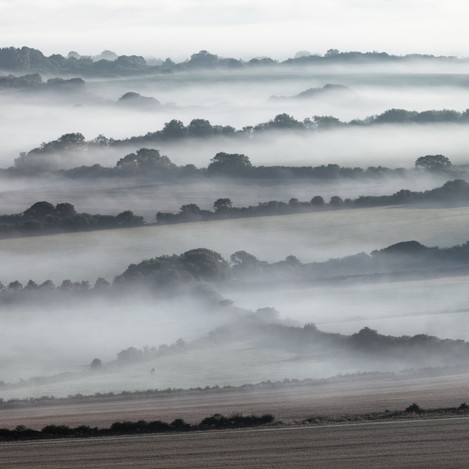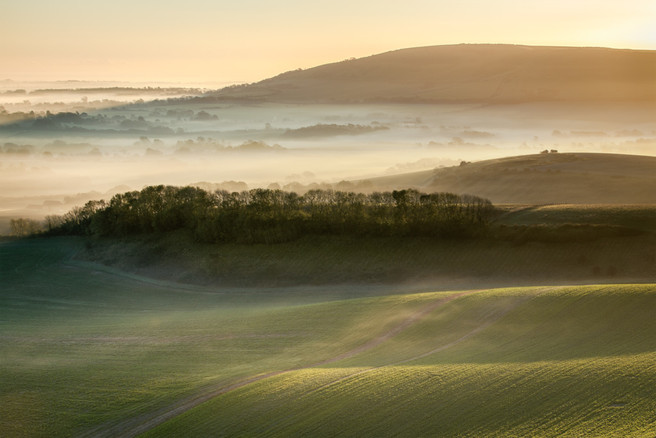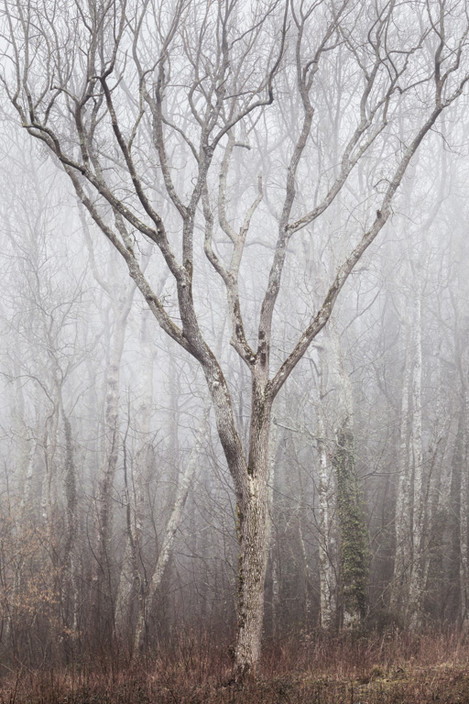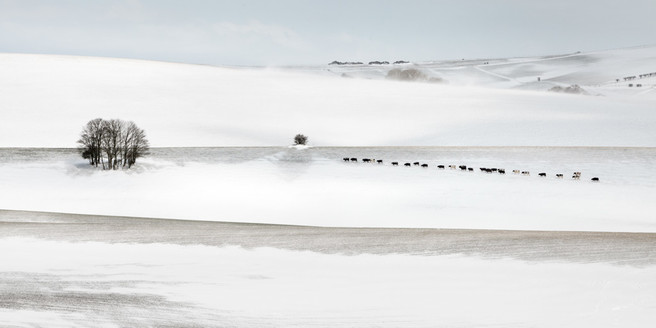Finn talks about setting up Brighton Photography Gallery & the first exhibitions

Finn Hopson
Finn Hopson is a photographer from Brighton. Having grown up playing on the beach and the South Downs he has spent the last eleven years photographing them. In 2014 he opened the Brighton Photography Gallery.

Tim Parkin
Amateur Photographer who plays with big cameras and film when in between digital photographs.
In March, I spent a weekend in Sussex, meeting and talking with other photographers such as Valda Bailey (who has been a previous featured photographer) and David Higgs (who had an exhibition which was reviewed in a previous issue and whose interview will be in the next issue).
Finn Hopson owns the Brighton Photography Gallery and has recently put on the exhibition 'Southbound', which I mentioned in the previous issue.
I caught up with Finn early one Sunday morning to hear more about his journey from TV editing into landscape photography and his aspirations for his new gallery.
======
Tim Parkin: In terms of background how did you get into photography to here?
Finn Hopson: Not really a path, a meander, no planned route! I worked in TV for years and I ended up as an editor doing lots of work in front of PCs, working with people who were shooting on stills cameras. I started at children’s BBC, then channel 4, which went onto other things and then corporate stuff. Which was soul destroyingly awful.
It did let me to live down here and I took work home. Alongside of all of this, I was hanging out with a lot of people who were working with cameras, light crews and DAPs. They all loved to chat about everything they did. If you chat to a guy who has done it for 50 years, he’ll tell you everything about this lens, why that lens, why this choice is good and why that’s bad. I worked with a director who always had a camera with him.
So I ended up interested in doing that kind of thing. Wasn’t a clear route…..was in the early 2000’s. Which was when I moved to London and started to do TV. So I developed an interest in photography, which I probably had all along, and found an outlet for it.
I took pictures all the time, but stayed as an editor as it was the bread and butter of it. What was very interesting was when you got the 5D Mark II coming out and you could shoot video on a stills camera. I started with this quite quickly and I found myself dealing with the same technology all the time. I was editing footage from 5D Mark II and I was talking to people who were using them.
TP: So those cameras penetrated the video / TV market quite quickly?
FH: As soon as they came out people were saying ‘we can do B camera on this’, but were technically not allowed to use them.
TP: They were not BBC approved?
FH: No it wasn’t, but I slotted shots into edits anyway. As long as they didn’t know and you didn’t tell the engineering geeks, it was fine. It made very little difference. Picking up work along the way which I did alongside the editing. ‘oh you’ve got a camera, well we need some stills on set’. So I was doing a lot of behind the scenes documentaries for comedies. Like "The IT crowd", I went along and did a couple of days behind the scenes and did stills as well. So photography developed as a side thing which made me a bit of money.
TP: Was this for the web and peripheral content which went along side the programme?
FH: Web stuff, DVDs all those kinds of content which surrounds a programme. It's no longer good enough to make a good programme, you have to have extra content. Not necessarily good content, but it’s fun to make anyway. What it leads to is an extra interest for me, which turned into an extra revenue stream. This was all in London as by 2009 I was living in Brighton and travelling up to London.
TP: Not much landscape in London? A few parks?
FH: No there isn’t! Landscape comes from spending spare time in the hills. Since I was a kid, I’ve spent my spare time riding my bike on the downs and walking in the hills around Brighton. That was the thing I missed about London and the TV work. The idea was to come back and live by the beach.
I began to see a way to make money but not necessarily by taking the photos I wanted to take, but a way of justifying anything from pieces of kit to developing my interest in landscape further.
TP: You haven’t been doing landscapes for too long then?
FH: It’s hard to define. "when did I take my first serious shot?", "when was my first proper one". Aren't these questions I'm sure we all ask? I really don’t know, I think it was 2010, something like that. It developed like most people in Brighton, because I was drawn to the beach.
You should see it on a low tide, when the sunset is nice. Hundreds of people lined up on the beach. There are a lot of people who are enthusiastic about photography in Brighton. So that’s the easiest thing to muck around with. I’ve lived here and been coming here forever.
I was then on the Downs and found myself taking pictures whilst I was cycling. I was taking photos again and seeing these places again. Thinking “I like that tree!”. So I started carrying a camera and shooting an occasional shot whilst riding. Then thinking, 'but not right now', it needs the right light or a different season, and gradually an obsession set in! I think it was 2010 when I found myself for the first time deliberately setting alarms and trying to find 'that' field in 'that' light.
TP: That’s when you get a morning for the first time and you get really addicted to it!
FH: All familiar places but seen in a way that I’ve never seen them. Particularly the mornings which were a revelation. I spent a lot of time cycling in the evenings and we did rides which went on into the night. We’d be up there in the middle of the night with lights. I’d see these beautiful evenings and beautiful things would be happening, but it was the mornings that captured my interest.
TP: I prefer mornings, there’s a stillness to it, a crispness. Feels like you’ve got it to yourself.
FH: A good chance to explore slowly as well. That’s the thing that I really liked, whizzing through places and finding interesting locations. When I was a kid I always had a camera but went off and did a degree in psychology. I finished my psychology degree and I thought ‘that was awful!’ and I had a friend who worked at the BBC and managed to get me a job as a runner. Then it was like ‘I’m back in visual land!’
TP: Where did you do your degree?
FH: In Durham, chosen for it’s scenic qualities. I made all my choices based on where’s the best cycling, so it was all north. Peaks, Lakes, Northumberland, somewhere hilly and as far from Brighton as possible. Not because I didn’t like Brighton but because if you’re going to live somewhere else then why not somewhere completely different. Durham is a Beautiful city though, I remember visiting thinking ‘This is great!”
TP: Where you in the Harry Potter Hall?
FH: No, they were too posh for me. I was up on the hill, Collingwood college. A glorious place. I enjoyed it and the couple of times I nipped over to The Lakes, I thought ‘Wow!’. I could jump in a car and be in The Lakes the same day, a couple of hours.
TP: Yes the North allows quite a lot of scope for travel unlike when I first came down to London when I thought the whole of the city was available to me. But then I realised that I could get from Leeds to Liverpool quicker than I could from one side of London to the other.
FH: Used to take me the same time to get across London, as it did from the edge of London to Brighton. You can get to Croydon in half an hour and then four hours slog to Northumberland. I like London to visit, I just don’t want to live in the middle of it. I loved it when I started commuting back up there and arrived in the train in the middle of the city.
TP: So you were doing professional photography?
FH: Yes I was. But it was weird – at what point do you become a professional or not? By that point I was making some money from it and as a freelance editor I was being paid. I was on a daily or hourly rate and it was good money.
It turned out if someone wanted me to come along and do some photography, then I could charge slightly more. They were paying me for my time, so I thought I could turn this boring yet functional photography that pays me well enough to keep me interested in photography then that would be great.
But my heart was never in it. I did a project where I had to do head shots of bankers in HSBC. They needed every member of a particular team photographed and there were over 1,000 of them. They were spread all over the globe so we had to get them when they were in London and they could come and see me. I was setting up 60 headshots a day in a row. I got quick at changing lighting set ups, that was good. But no benefit apart from quickly going ‘lights down and do this’. They didn’t want them on the same background, so every single person had to be casually posed. At the coffee shop, at the window….after 20 you think there’s nothing left, it’s all grey. I don’t think I was doing that particularly well. If anyone looked at it back then, they wouldn’t think I was pushing any boundaries.
The good thing was saying yes to it, then quickly working out if I could do it ok, it wouldn’t be ground breaking, but I learnt very fast how to deal with all that side of things.

